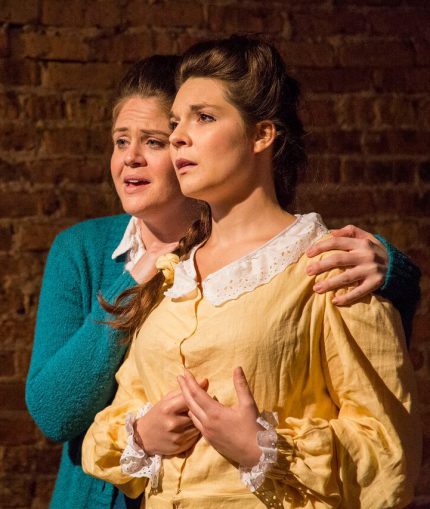Muhly’s “Dark Sisters” receives powerful Chicago premiere from Third Eye Theatre Ensemble

You really have to give it to Third Eye Theatre Ensemble. What other local company presents contemporary operas by important composers on a shoestring in excellent, up close-and-personal stagings? And provides free Halloween candy on the way out?
Goodies apart, the storefront company is clearly on a roll in its third season, following its riveting debut production of Gian Carlo Menotti’s The Medium, and Mohammed Fairouz’s Sumeida’s Song last year.
For this fall’s show, the upstart troupe continued its theme of spirituality gone awry by presenting the Midwest premiere of Nico Muhly’s Dark Sisters, which opened Friday night at the Prop Theatre on the Northwest side.
Following his successful first opera Two Boys, Muhly wrote Dark Sisters, a more intimate work that was premiered by Gotham Chamber Opera in 2011. (Muhly’s third opera, Marnie, adapted from the 1964 Hitchcock film, will debut at the Met in 2019.)
Dark Sisters was inspired by a 2009 raid by Texas authorities on the Yearning for Zion Ranch, a branch of the Fundamentalist Church of Latter-Day Saints, due to allegations of child abuse. After 439 of the community’s children were taken into custody, a media circus ensued around the polygamous sect, with the ranch’s women pleading on TV for the return of their children, and the event raising questions about government overreach versus the free practice of religion.
To Muhly’s credit, his opera’s fictionalized scenario depicting the ranch’s unnamed “Prophet” and his five wives doesn’t engage in the typical cardboard media caricatures of religious women. Instead, he treats their fraught situations and varied personalities fairly and sensitively–within the decidedly medieval milieu of a patriarchal society in which multiple women must serve their husband/religious leader with unquestioning obedience.
Dark Sisters is cast in Muhly’s characteristic brand of approachable tonal post-minimalism–greatly aided by Stephen Karam’s direct, conversational libretto–with the composer’s spare, luminous lyricism reflecting a humanity and sympathy with the characters. The music is crafted with typical skill and all the main characters get their moment in the sun. The score rises to striking heights at times, as with the remarkable sextet that concludes Act 1 and the scene where the woman are being interviewed on a cable news show and each spins off simultaneously into her own interior dramatic soliloquy.
The opera received indifferent reviews in its New York premiere but Dark Sisters is an effective, gripping work with an engaging score that intelligently examines difficult contemporary issues. The powerful opening-night performance delivered by Third Eye Theatre provided searing dramatic sizzle in the tiny black box venue along with consistently inspired singing.
In the central role of the dubious wife Eliza, Kelley Hollis was the fulcrum of the evening. Dismayed by the Prophet’s abusive behavior, Eliza gradually begins to question her submission to the community, which puts her into conflict with her husband, as well as the other, more pliant wives. Hollis brought vocal strength and dramatic credibility to the role, singing with distinction and making Eliza’s struggle to assert herself and leave the ranch wholly believable and intensely compelling.
The remaining roles were filled out with comparable excellence. Mary Lutz Govertsen displayed a flexible soprano as the credulous Almera. Melissa Arning showed her striking, contralto-like mezzo to touching effect as the vulnerable ill-fated Ruth, and provided a powerful highlight in her ode to her dead son.
Equally strong was Angela Born as Lucinda, Eliza’s 15-year-old daughter who resents being forced into marriage to a much older man but lacks the strength to leave the community with her mother. Born sang with a youthful, attractive soprano and brought dramatic conviction to her Act II aria.
As the fearful, bickering Zina and Presendia, Meghan Guse and Sara Litchfield effectively rounded out the cast of sister-wives.
Brad Jungwirth brought a robust and aptly authoritative baritone to the domineering role of the community’s Prophet and husband. He also doubled effectively as the prissy, patronizing TV host King—an odious Maury Povich-like figure, who is only interested in exploiting the religious women for sensationalism, and is wholly unconcerned about their plight or that of their children.
Rose Freeman provided her usual resourceful and understated direction in the tight space, positioning the outcast sect members effectively amid the audience. Jimmy Jagos’ slatted wooden gate and projections painted the milieu economically, aided by Sarah Collonge’s artful lighting, and Delena Bradley’s shapeless pastel dresses for the women.
Third Eye’s gifted musical director Jason Carlson conducted with characteristic clarity and concentration from the electronic piano, filling in textures so imaginatively with organ timbres and synthesized strings that an orchestra was hardly missed.
One hopes that some well-heeled benefactor will come along soon to help the dynamic and enterprising Third Eye Theatre troupe expand their season and get to the next level.
Dark Sisters runs through November 6 with alternating casts at the Prop Theatre, 3502 N. Elston. thirdeyete.com
Posted in Performances




